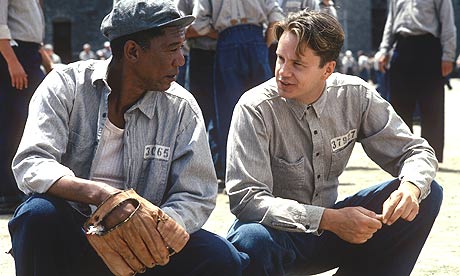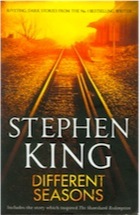Three of this book's four novellas are better known as
films, and rightly so. But the fourth has an odd, unsettling power

Better on film ... Morgan Freeman and Tim
Robbins in The Shawshank Redemption. Photograph: ITV / Rex
I once had an argument with
somebody about The Shawshank Redemption. It wasn't complicated: they didn't
believe me that it was written by Stephen King. When I
assured them that it was, and that it was published in the same novella
compendium as the story that became the classic 80s movie Stand By Me, it was
possible to see their belief system crumble. This film that they loved – like so
many people, their favourite film (going by the fact that it's currently rated
the best movie of all time
over at IMDB – was based on a story by the man who wrote that book about the
killer clown. That it says it at the very start of the movie, in the opening
credits, is almost immaterial: to most people, it doesn't feel as they imagine a
Stephen King story should. There's nothing weird, mystical. There's no horror, and he is, after all,
a horror writer. (Of course, now I see that there is horror in the stories, just
maybe not the horror that I was used to from him: instead, it's the horror of
emotional lurches, of war crimes, of being an overly inquisitive kid, of telling
stories designed to unsettle and shock: but it's a horror you have to want to
see, I suspect.)
 Way back when – and I
actually can't remember the first time that I read this, only that I did; and
possibly more than once, given the state of my collapsing copy – I didn't read
this with any baggage. It's a King book, I thought. And the cover of my edition
was about as "generic horror
book" as it's possible to find. Based on that cover (bats, full moon,
screaming woman, slash of blood), I expected Salems Lot 2: A Lot More. So, I
read the stories, but found myself marginally disappointed. Different Seasons is
a collection of four novellas, published together because they were, according
to King, "mainstream (almost as depressing a word as genre)", and yet sold as
any other of his novels was. So, my misunderstanding of what I was coming to
read was understandable; my relative dislike my fault, however, not his.
Way back when – and I
actually can't remember the first time that I read this, only that I did; and
possibly more than once, given the state of my collapsing copy – I didn't read
this with any baggage. It's a King book, I thought. And the cover of my edition
was about as "generic horror
book" as it's possible to find. Based on that cover (bats, full moon,
screaming woman, slash of blood), I expected Salems Lot 2: A Lot More. So, I
read the stories, but found myself marginally disappointed. Different Seasons is
a collection of four novellas, published together because they were, according
to King, "mainstream (almost as depressing a word as genre)", and yet sold as
any other of his novels was. So, my misunderstanding of what I was coming to
read was understandable; my relative dislike my fault, however, not his.
No comments:
Post a Comment